Decoding computer science’s future
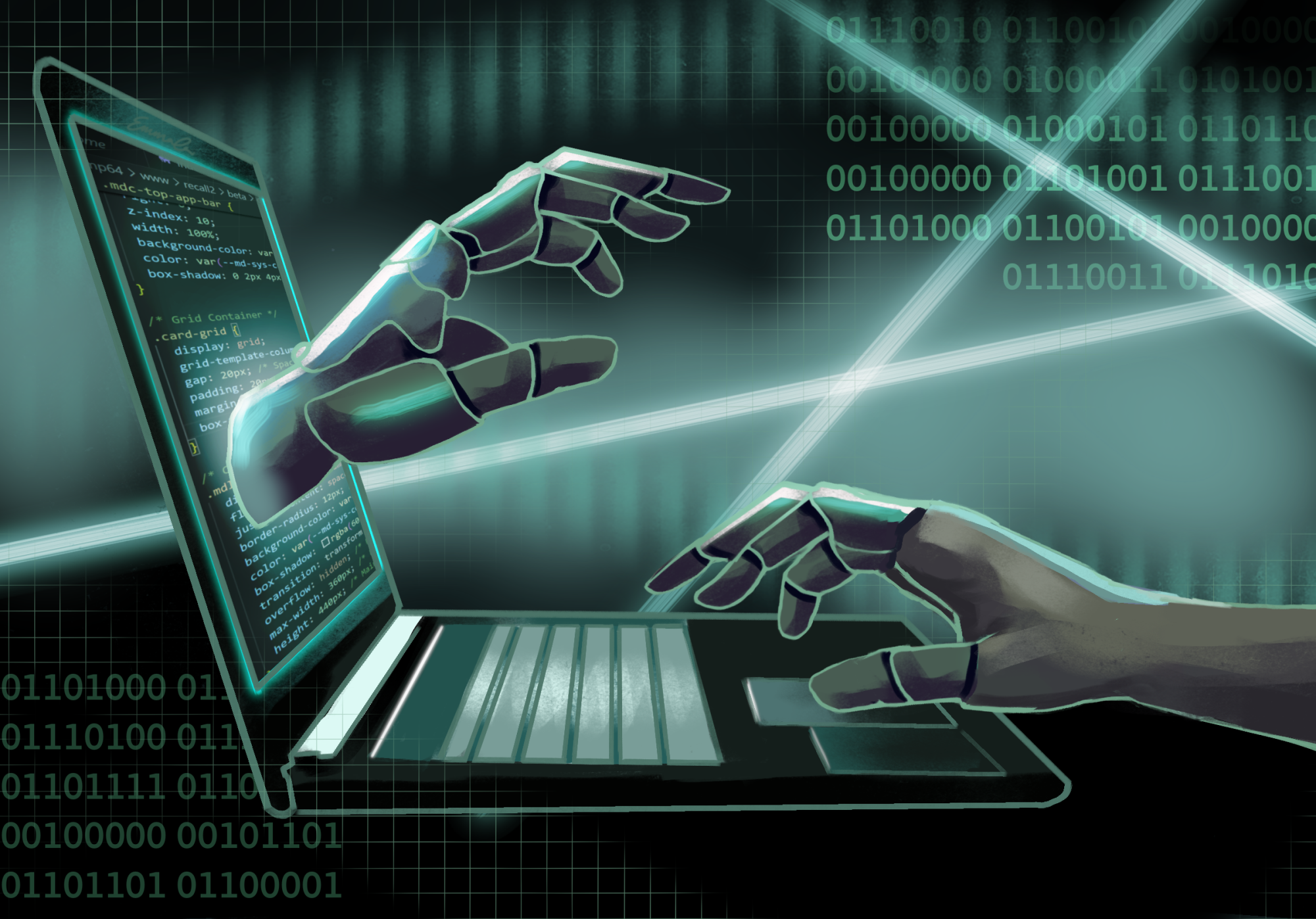
Computer science has long been one of the most popular degrees among Harker graduates, according to alumni LinkedIn profiles. Today, CS still remains a top choice for many: 65% of 101 respondents to a survey sent to upper school students on Jan. 21 said that they would consider a CS degree. Recent changes to the industry, like the rise of AI, job oversaturation and tech layoffs have produced mixed feelings among students about the future of careers in tech.
Some students, like AP Computer Science A with Data Structures student Anirudh Submaranian (10), still plan to enter the industry. He intends to pursue his interest in programming despite some businesses downsizing their workforces.
“I don’t really think this is going to be a long-term trend,” Anirudh said. “It’s certainly not going to deter me from pursuing my passion in CS. When I enter the job market, I feel like I’d be in a suitable position for a job.”
Programming Club officer Andrew Liang (12) voiced concerns over the accelerating development of artificial intelligence. As a competitive programmer, he noticed the impressive progress models like ChatGPT made in solving coding questions, which is a common benchmark in programming proficiency.
“This is scary, especially considering that Mark Zuckerberg is planning to lay off some of the lower-level employees,” Andrew said. “If your main job is to write code, your job prospects right now are not looking the best.”
Andrew still plans to enter the CS field, but with the intention of studying AI. He acknowledges both its potential and risks.
“AI has the ability to learn insanely quickly,” Andrew said. “It’s completely unlike anything we know of. My biggest fear is that AI is able to replicate itself. I do want to study AI later, not only as a tool as we’ve always seen it, but also as something that we need to use more carefully.”
Several survey respondents specified that they believe AI will not eliminate or reduce CS jobs but instead cause the workplace to demand different skills and focuses.
“People say that the CS job market is in decline, but in my opinion it’s just going to transform,” Girls Programming League co-president Saanvi Bhargava (12) said. “I don’t think the quantity of jobs will go down, but the types of jobs will lean to be more forward thinking and design oriented, and it’ll be harder to get a job if your only skills are coding.”
With the evolving landscape of the tech industry, students like Saanvi are considering alternative career paths or further education to adapt to changes in the job market.
“I plan to major in CS, but I do plan to add a second major or get a concentration,” Saanvi said. “I might do a concentration in AI depending on the college I go to, or I might add a business or econ [major]. Being flexible is important.”
Harvard sophomore Sabrina Zhu (‘23) studied CS extensively during high school but has since shifted to the field of finance. Though her decision to change courses was independent of industry dynamics, she accredits her time in college as essential to finding her true interests without the peer pressure of so many CS-focused students.
“Once you leave the Harker-Silicon Valley bubble, you’re exposed to so many more career paths and you finally have the chance to explore what’s the most interesting for you,” Sabrina said. “At Harker, everyone was doing tech and that’s what I thought I was going to do, so I spent a lot of time pursuing that and didn’t really consider anything else. In college, I was able to realize that maybe tech and software engineering wasn’t the right thing for me.”
Pursuing a PhD is another way to explore the field in depth and achieve advanced qualifications, which would provide a competitive edge in the job market. However, third-year CS PhD student at UC Berkeley Rajiv Movva (‘19) believes that an undergraduate degree is sufficient to find employment in the industry.
“The main reason to do a PhD is that there’s more flexibility to develop your interests, rather than to get hired for a specific role,” Movva said. “At a company, even if you’re doing research, it needs to help the company in some way. In a PhD, you can do whatever you want—which especially matters if you want to work on overlooked problems or think about the social impacts of AI, for example.”
Despite challenges within the CS industry, Movva urges students to prioritize passions and personal interests, not only market trends, when choosing educational paths and careers. He believes that this approach will enable long-term success and fulfillment.
“Build things that seem exciting to you,” Movva said. “Following what excites you is the best way to develop passion and expertise. That’s ultimately what will help you decide what you want to spend your time on in the future.”
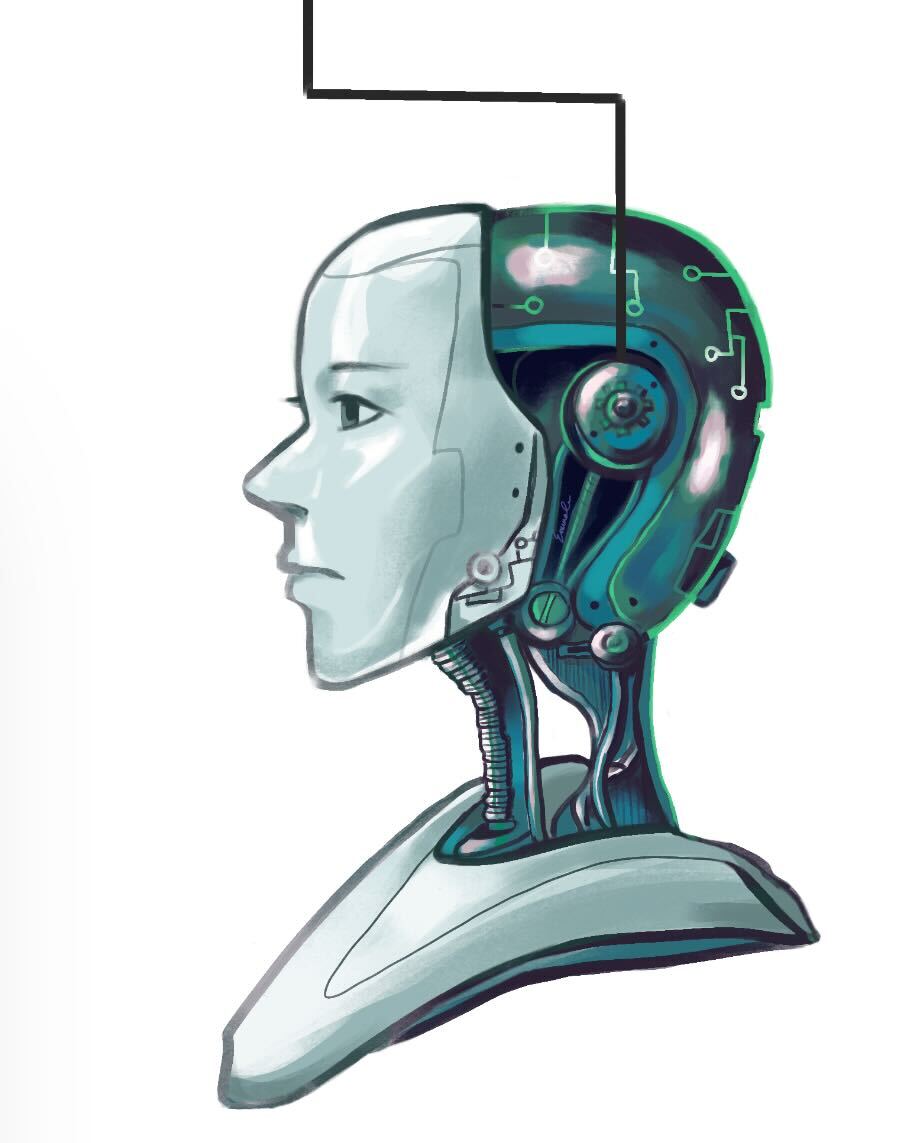
With the rapid advancement of artificial intelligence, the technology sector faces a looming paradigm shift. As AI models like ChatGPT, Gemini and the recent DeepSeek become more proficient in programming, their role in software development will expand.
Junior developers typically handle basic coding or bug fixes, which often include repetitive coding tasks. AI can now automate many of these responsibilities, increasing the efficiency of the programming process.
“We’re still at the infancy of AI, but it does seem like a pivotal time,” computer science teacher Marina Peregrino said. “We might be at [the] level where we ask AI to generate code for us. It’s no longer clunky or weird, and it’s actually pretty decent code.”
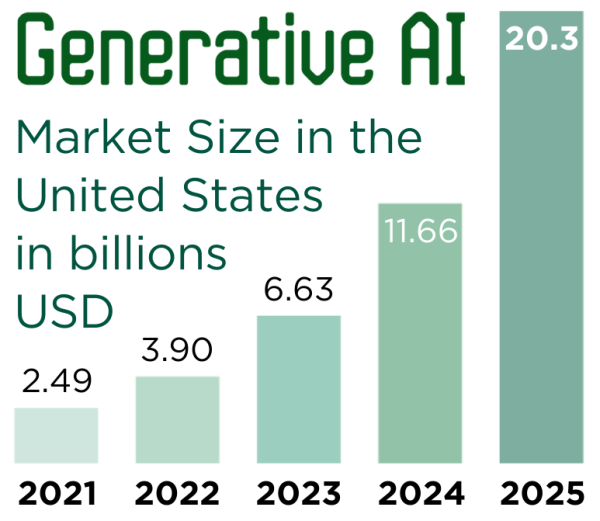
Nonetheless, a majority of Harker students remain confident in the value of human developers in the current CS industry. In a survey sent out to upper school students on Jan. 21, 54.5% of 101 respondents said recent developments in generative AI had not influenced their likelihood of considering a career in CS, while 28.7% of respondents stated that they were now less likely to pursue a CS career.
Despite some fears of automation, it remains unlikely that AI will fully replace human developers. According to AI investor Raymond Xu (‘16), who works at the venture capital firm Bond, very few companies plan to use AI to complete any software development tasks independently.
“Models are not yet smart enough,” Xu said. “It’s some degree off, and that difference is huge in a world where you want things to be production-ready. There are a lot of internal systems around coding that haven’t been codified formally, like where to pull different requests or who are the best people at the firm that know the right way to perform certain tasks. It takes time for AI systems to learn all those things and use that context.”
Workplaces will likely evolve into a collaborative space where developers expedite their work with AI tools. Although human employees will still direct the programming process, AI can complete subtasks and expedite code writing, allowing developers to devote more energy to high-level tasks, like design and problem-solving.
“At its core, computer science is a mental model and a logical framework for how you tackle problems and decompose big projects or tasks into smaller individual components,” Xu said. “From a mental model standpoint, all the things that you learn in computer science are still relevant.”
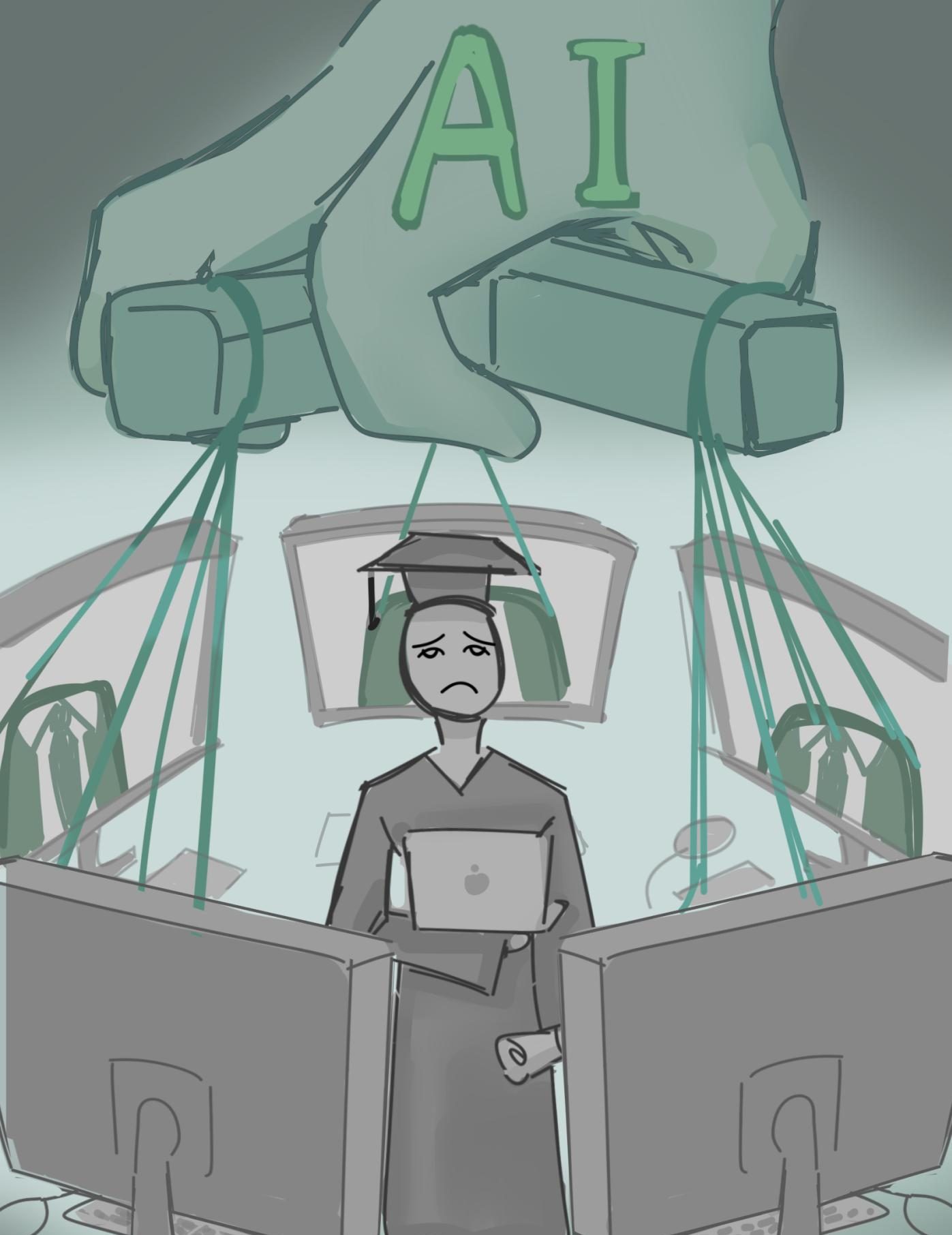
Once seen as a gateway to stability and high salaries, careers in computer science now face intense competition and waves of layoffs.
In a survey sent out to upper school students on Jan. 21, 34.7% of 101 respondents indicated that they are considering a computer science career. However, their confidence in the opportunities available in the field are mixed, with 4% being very optimistic, 27.7% feeling slightly optimistic and 23.8% slightly pessimistic.
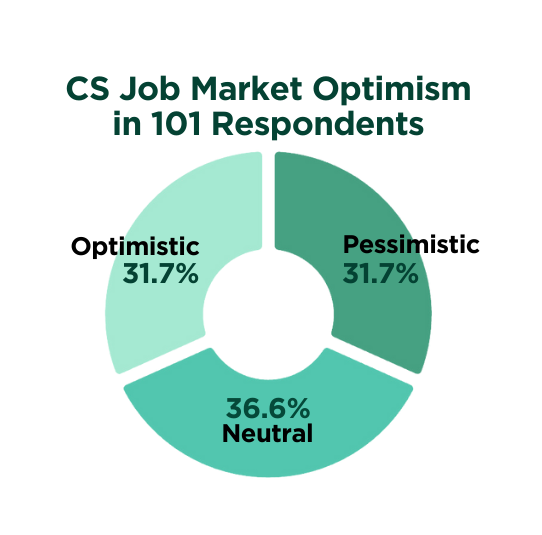
Many students and prospective students question the future of the industry given its recent turbulence and oversaturation. Software engineer Katherine Zhang (‘19) works at autonomous vehicle startup Applied Intuition and witnessed this shift firsthand. She observed a dramatic rise in highly qualified job applicants for computer science positions due to the appeal of financially secure tech jobs.
“Computer science was perceived as the stable option,” Zhang said. “It pays well, you’re not doing anything physically strenuous, the hours are pretty good. It’s a desirable job.”
According to computer science teacher and former software engineer Swati Mittal, some ostensibly entry-level roles now require two to three years of technical experience. She explains how the job market looked vastly different fifteen years ago.
“You would have four offers in your hands,” Mittal said. “You were the one who was negotiating. Now, the coin has flipped. Companies are at a stronger position. They’re saying, ‘Take it or leave it.’”
The tech sector experienced a surge in demand for digital technology during the COVID-19 pandemic, including video conferencing platforms like Zoom and Google Meet or e-commerce platforms like Amazon. Companies increased hiring in anticipation of long-term growth, assuming that the shift to digital reliance would be permanent.
“Boom-and-bust cycles and hire-and-fire cycles have always been a part of any industry,” Zhang said. “When things are looking good, companies like Google that are really large and can afford to spend a lot of money will hire tons and tons of engineers, including ones that they don’t necessarily need.”
Many businesses reduced their oversized workforces during the past few years of economic decline after the end of the quarantine tech boom and significant inflation. This downsizing trend still persists two years later, as tech companies like Meta and Microsoft laid off a collective ten thousand employees in the last month alone. Many computer science professionals face the daunting prospect of potentially losing their jobs.
“My mother originally worked at [Norton],” Anirudh said. “[She] did get laid off, but she was able to get another software engineering job [at Discover] without too much difficulty. It’s unfortunate for people who do get laid off, but that’s the nature of any job where the market is competitive, and computer science is seeing an increase of that.”
In the abundance of qualified professionals, prospective software engineers should consider pursuing technical specialization, gaining hands-on experience and improving soft skills like communication and teamwork.
“Think about what is a good differentiator for you—and it doesn’t even necessarily have to be CS-related,” Zhang said. “At my company, good leadership, teaching and people skills are really valuable because we’re business-to-business: we need someone who’s not just a great engineer, but who can talk directly to customers.”






